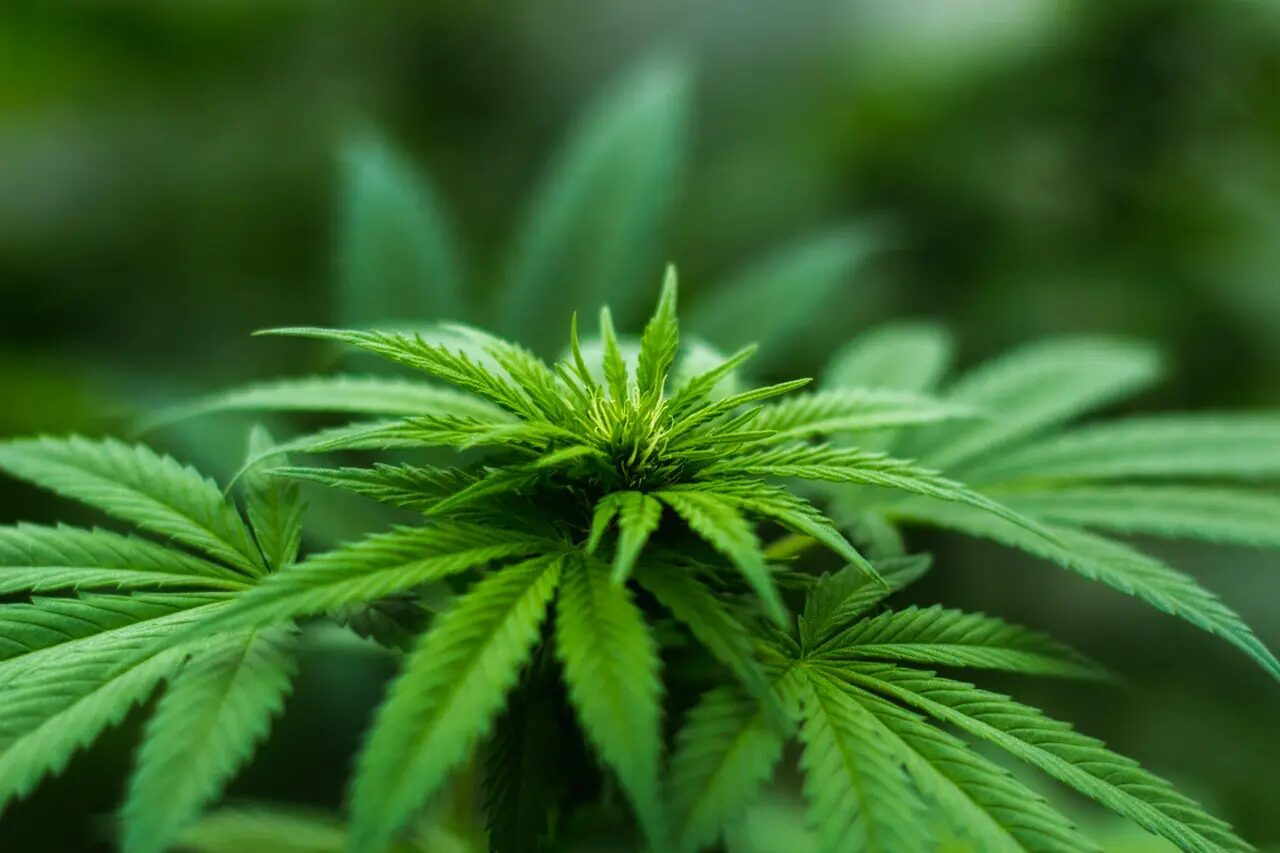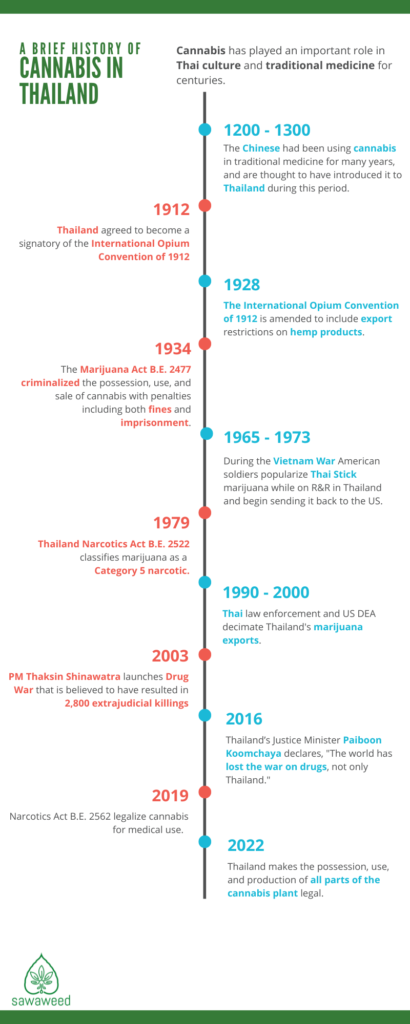Last updated on September 26th, 2023 at 08:27 am
While most discussion of cannabis in Thailand is focused on the recent legal changes, the history of marijuana in Thailand goes back much farther.
Researchers believe that hemp may have been one of the first plants to be regularly cultivated by early civilizations. There is evidence indicating that cannabis may have been cultivated in Japan as far back as 8,000 BC.
Artifacts in China suggest that hemp was being cultivated in the 5th millennium BC.
Early History of Marijuana Use in Thailand
While it’s unknown exactly when cannabis was introduced to Thailand, it is believed to have been via India as the Thai word for marijuana is ganja (กัญชา) which is the same as the Sanskrit word which was a language widely used in India during ancient times.
Despite the fact that there is scant written history of cannabis in Thailand, it is known that cannabis was used as a medicine, a food flavoring, a source of dietary fiber, for hemp products, and for the euphoric high that it produced.
For at least several hundred years, if not thousands of years, cannabis was a normal part of traditional Thai life.
There are reports that cannabis was used as an analgesic (pain reliever) and that Muay Thai fighters and farmers used to use cannabis-based topical ointments for muscle fatigue.
Cannabis was a core medicinal herb dating back at least 4,000 years. Chinese traders began coming to Thailand in the 13th century, and it is thought that some traditional Chinese medicines found their way into local Thai traditional medicine practice during that period.
Cannabis was used medicinally to treat migraine headaches, cholera, malaria, digestion problems, and post-childbirth pain
Up until cannabis was made illegal in Thailand, cannabis was used as in many Thai recipes. The most famous marijuana-infused dish was boat noodle soup, kuaytiaw reua (น้ำซุปก๋วยเตี๋ยวเรือ), which contained both beef and pork in a dark sauce.
Thais were also known to use hemp in clothing and other fabrics. Muay Thai fighters used to wrap their hands in hemp fabric before Western-style boxing gloves were introduced.
Marijuana Goes Down the Path of Criminalization
Up until the Marijuana Act B.E. 2477 (1934), initiated by Prime Minister General Phot Phahonyothin, there were no laws against the growth or use of cannabis in Thailand.
The Marijuana Act B.E. 2477 criminalized the possession, usage, and sale of cannabis with penalties including both fines and imprisonment.
However, prior to 1934, in an effort to receive international assistance, Thailand agreed to become a signatory of the International Opium Convention of 1912.
Though cannabis was not restricted in the original 1912 convention, in 1928 the agreement was amended to restrict the export of hemp to countries where hemp was prohibited.
So, while cannabis was not criminalized until 1934, restrictions on exports started as early as 1928.
Marijuana Goes Underground in Thailand
Despite the criminalization of cannabis in 1934, cannabis was still widely grown and used in Thailand.
Many Thais still alive today recall growing up on cannabis farms with minimal interference from law enforcement or the government. Some claim that almost every home had a small marijuana garden to use either as herbs or for medicine, and that more recent changes in the law have almost erased history of marijuana in Thailand.
In fact, American soldiers on R&R breaks from fighting in Vietnam (1965 – 1973) made Thai Sticks famous around the world, often shipping home Thai marijuana to the United States using the military postal system.
Even the term “bong” used for water pipes today is thought to have been brought back to the US by American soldiers who smoked marijuana in Thailand using bamboo water pipes the locals called a “bhaung”.
Marijuana in Thailand Gets Serious Penalties
US president Richard Nixon declared “drug abuse” to be public enemy number one in the United States in 1971 and formed the US Drug Enforcement Agency (DEA) in 1973.
The United States felt that Thailand’s criminalization of cannabis in 1934 didn’t do enough to penalize drug use and drug trafficking.
The DEA and its predecessor, the Bureau of Narcotics and Dangerous Drugs, had been active in Thailand since 1963 and it is thought that they pressured the Thai government to become more aggressive against drugs in Thailand.
It wouldn’t be until the introduction of the Narcotics Control Act, B.E. 2519 (1976) which mandated the formation of an Office of Narcotics Control Board (ONCB) that the real crackdown on cannabis would begin in earnest.
Thailand’s marijuana history would take a dark turn in 1979, when the ONCB would work to combine many of Thailand’s drug laws under one overarching law, Thailand Narcotics Act, B.E. 2522 which classified marijuana as a Category 5 narcotic with a maximum sentence of 5 years and-or a fine of 50,000 baht for quantities up to 10kg.
Possession of quantities over 10kg was automatically considered intent to sell which resulted in penalties of 2 – 15 years in prison and-or fines ranging from 20,000 – 150,000 baht.
The penalties are the same today as they were when the Thailand Narcotics Act came into being and remain some of the harshest in the world.
Thailand Becomes a Major Marijuana Exporter
Due to the demand created by US soldiers during the Vietnam War and the reputation of Thai Stick being some of the most potent marijuana available, during the 1970’s and through much of the 1980’s, Thailand would be one of the world’s leading exporters of marijuana.
Through relentless efforts by the DEA in Thailand and Thai law enforcement, marijuana supplies to the US eventually shifted from Thailand to Central and South America in the 1980’s and 1990’s.
In 2003 Prime Minister Thaksin Shinawatra launched all-out war on all drugs. Groups such as Human Rights Watch estimate that over 2,800 people died in extrajudicial killings, with over half later found to have no connection to the drug trade.
Thailand Begins to Realize The War is Lost
In what would be a shocking announcement to hear from a government official, but something that seems obvious to most that have seen the results of the drug war, Thailand’s Justice Minister Paiboon Koomchaya declared in 2016, “The world has lost the war on drugs, not only Thailand. We have clear numbers that drug use has increased over the past three years. Another indicator is there are more prisoners.”
Although Paiboon’s comments primarily focused on methamphetamine (yaba) use, many heard it as an admission that the entire emphasis of criminalizing drug use rather than focusing on treating the addiction was a lost cause.
Thailand Legalizes Medicinal Marijuana
On December 25, 2018, the Thai government passed a proposal (Narcotics Act B.E. 2562) that would legalize cannabis for medical use. It took effect in Feb 19, 2019 when it was published in the Royal Gazette.
Between Feb 2019 and June 2022, the government began to slowly make good on it’s promise of legalizing medical marijuana.
Clinics across the country opened. Though cannabis was still strictly controlled. Clinics had to be specially licensed to prescribe medical cannabis and doctors also had to receive special licenses to prescribe cannabis therapy.
During this period it seemed that there was often a disconnect between how the law was described and how it worked in practice.
For instance, while farmers could seek permission to grow cannabis, it was a time consuming process. This meant that there was a lack of cannabis medicines and waiting lists for patients.
Click on image for full-sized version
Updated 25-Jun-2022

